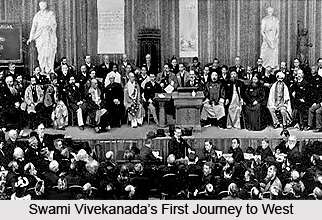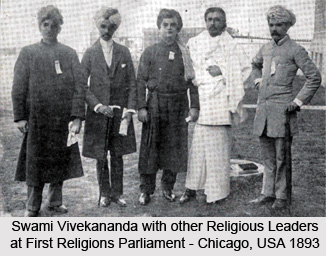 Swami Vivekananda set out on his first trip to the West on May 31, 1893. He arrived in Mumbai accompanied by the private secretary to the Raja of Khetri. The king provided him with a robe of orange silk, an ochre turban, a handsome purse, and a first-class ticket on the S.S. `Peninsular` of the Peninsular. The ship slowly sailing reached Colombo where Swamiji visited the monasteries of the Hinayana Buddhists. Next the boat reached Japan, and the Swami visited Yokohama, Osaka, Kyoto, and Tokyo.
Swami Vivekananda set out on his first trip to the West on May 31, 1893. He arrived in Mumbai accompanied by the private secretary to the Raja of Khetri. The king provided him with a robe of orange silk, an ochre turban, a handsome purse, and a first-class ticket on the S.S. `Peninsular` of the Peninsular. The ship slowly sailing reached Colombo where Swamiji visited the monasteries of the Hinayana Buddhists. Next the boat reached Japan, and the Swami visited Yokohama, Osaka, Kyoto, and Tokyo.
Soon after his arrival in Chicago, he went one day to the information bureau of the Exposition to ask about the forthcoming Parliament of Religions. He was told that it had been put off until the first week of September and that no one without credentials from a bona fide organization would be accepted as a delegate. He was told also that it was then too late for him to be registered as delegates. In the meantime, the purse that the Swami had carried from India was dwindling; hence we went to stay in Boston. He came in contact with Professor John Henry Wright of Harvard University. After inviting him to speak at Harvard and on learning from him not having credentials to speak at the Parliament, Wright is quoted as having said, "To ask for your credentials is like asking the sun to state its right to shine in the heavens." Wright then addressed a letter to the Chairman in charge of delegates writing, "Here is a man who is more learned than all of our learned professors put together." However Swamiji had mislaid, unfortunately, the address of the committee in charge of the delegates. Mrs. George W. Hale, a society woman of Chicago came forward and took him to offices of the Parliament and presented him to Dr. J.H. Barrows, the President of the Parliament,
Swami Vivekanada at Parliament of World Religions
The Parliament of Religions opened on 11 September 1893 at the Art Institute of Chicago. The spacious hall and the huge gallery of the art Palace were packed with seven thousand people. Each of the delegates represented their own religions but Vivekananda, represented no particular sect, but the Universal Religion of the Vedas. After all the delegates had finished Swamiji bowed to Goddess Saraswati, the Goddess of Wisdom, he addressed the audience as `Sisters and Brothers of America.` Instantly, thousands arose in their seats and gave him loud applause. Swamiji began his speech by thanking the youngest of the nations in the name of the most ancient monastic order in the world, the Vedic order of sannyasins. The keynote of his address was universal toleration and acceptance. He told the audience how India, even in olden times, had given shelters to the religious refugees of other lands - for instance, the Israelites and the Zoroastrians - and he quoted from the scriptures the following two passages revealing the Hindu spirit of toleration:

`As different streams, having their sources in different places, all mingle their water in the sea, so, O Lord, the different paths which men take through different tendencies, various though they appear, crooked or straight, all lead to Thee.`
In conclusion he pleaded for the quick termination of sectarianism, bigotry, and fanaticism. The response was deafening applause. The Swami had addressed his words on behalf of not only his religion, but all religions of the world. Whereas every one of the other delegates had spoken for his own ideal or his own sect, the Swami had spoken about God, who, as the ultimate goal of all faiths, is their inmost essence.
Swami Vivekananda shot to fame after his speech in the Parliament of World Religions and was known as an `orator by divine right` and as a `Messenger of Indian wisdom to the Western world`. Newspapers published his speeches and they were read with warm interest all over the country. They named him as the "Cyclonic monk from India". He spoke several more times at the Parliament on topics related to Hinduism and Buddhism. The parliament ended on 27 September 1893. All his speeches at the Parliament had one common theme `Universality` and stressed religious tolerance. Swamiji no longer suffered from material wants. The doors of the wealthy were thrown open.
Swami Vivekananda Lecturing on Vedanta
Soon Vivekananda was invited by a lecture bureau to tour the United States. He remain engaged in he was engaged in a tours covering the larger cities of the East and the Middle West. His lectures, intensely religious and philosophical, were attended everywhere by eminent people. The year following the Parliament of Religions the Swami devoted to addressing meetings in the vast area spreading from the Mississippi to the Atlantic. After Detroit, he divided his time between Chicago, New York, and Boston, and during the summer of 1894 addressed, by invitation, several meetings of the `Humane Conference` held at Greenacre, Massachusetts. Swamiji thus spent nearly two whole years lecturing in various parts of eastern and central United States, appearing chiefly in Chicago, Detroit, Boston, and New York.
Soon Swamiji began giving free and private classes on Vedanta and Yoga. He began to instruct several chosen disciples in Jnana yoga in order to clarify their intellects regarding the subtle truths of Vedanta, and also in raja-yoga to teach them the science of self-control, concentration, and meditation. In June 1895, for two months he conducted private lectures to a dozen of his disciples at the Thousand Island Park. He later founded the "Vedanta Society of New York".
During his first visit to America, he traveled to England twice-in 1895 and 1896. Swami`s greatest acquisition in London was Miss Margaret E. Noble, who later became his disciple as Sister Nivedita. She consecrated her life to women`s education and upliftment of the masses in India. He also received two academic offers, the chair of Eastern Philosophy at Harvard University and a similar position at Columbia University.
Swami Vivekananda`s ideas were admired by several scholars and famous thinkers. From West, he also set his Indian work in motion. Vivekananda wrote a stream of letters to India. Vivekananda left for India on 16 December 1896 from England with his disciples, Captain and Mrs. Sevier, and J.J. Goodwin and Sister Nivedita.




















